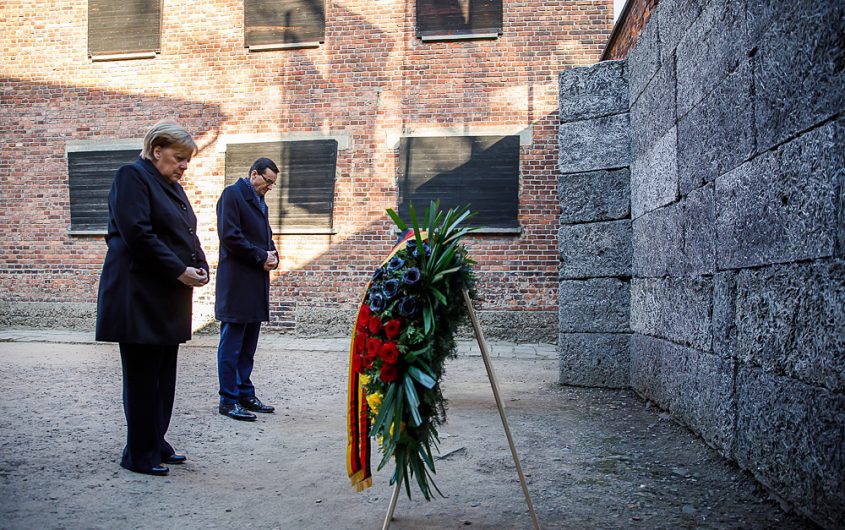
Prime Minister of Poland via Flickr
What is Angela Merkel’s Legacy for German Memory Culture?

Jennifer Yoder
Colby College
Jennifer Yoder is the Robert E. Diamond Professor of Government and Global Studies at Colby College. She is the author of two books: From East Germans to Germans? The New Post-Communist Elite and Crafting Democracy: Regional Politics in Post-Communist Europe. Her research examines political culture and identity in post-communist societies, the integration of eastern and western Germany as well as eastern and western Europe, and nationalist-populist challenges to Holocaust-centered memory in Europe

Jenny Wüstenberg
Nottingham Trent University
Jenny Wüstenberg is Associate Professor in Twentieth Century History at Nottingham Trent University. Dr. Wüstenberg joined NTU in September 2019. After receiving her PhD in Government & Politics from the University of Maryland, she worked at the School of International Service at American University, at the Free University of Berlin, for the Independent Academic Commission at the Federal Ministry of Justice for the Critical Study of the National Socialist Past. Dr. Wüstenberg’s previous position was DAAD Visiting Assistant Professor of Politics and German & European Studies at York University in Toronto.
Dr. Wüstenberg is the co-founder and current co-President of the Memory Studies Association, an international professional organisation that connects memory scholars and practitioners and holds an annual conference. She is also a member of the Commission on Remembering Social Democracy, set up by the German Federation of Trade Unions. She serves as co-editor of the Worlds of Memory book series with Berghahn Books, as well as reviewer for numerous journals and academic presses.

Lily Gardner Feldman
Senior Fellow
Dr. Lily Gardner Feldman is a Senior Fellow at AICGS. She previously served as the Harry & Helen Gray Senior Fellow at AICGS and directed the Institute’s Society, Culture & Politics Program. She has a PhD in Political Science from MIT.
From 1978 until 1991, Dr. Gardner Feldman was a professor of political science (tenured) at Tufts University in Boston. She was also a Research Associate at Harvard University’s Center for European Studies, where she chaired the German Study Group and edited German Politics and Society; and a Research Fellow at Harvard University’s Center for International Affairs, where she chaired the Seminar on the European Community and undertook research in the University Consortium for Research on North America. From 1990 until 1995, Dr. Gardner Feldman was the first Research Director of AICGS and its Co-director in 1995. From 1995 until 1999, she was a Senior Scholar in Residence at the BMW Center for German and European Studies at Georgetown University. She returned to Johns Hopkins University in 1999.
Dr. Gardner Feldman has published widely in the U.S. and Europe on German foreign policy, German-Jewish relations, international reconciliation, non-state entities as foreign policy players, and the EU as an international actor. Her latest publications are: Germany’s Foreign Policy of Reconciliation: From Enmity to Amity, 2014; “Die Bedeutung zivilgesellschaftlicher und staatlicher Institutionen: Zur Vielfalt und Komplexität von Versöhnung,” in Corine Defrance and Ulrich Pfeil, eds., Verständigung und Versöhnung, 2016; and “The Limits and Opportunities of Reconciliation with West Germany During the Cold War: A Comparative Analysis of France, Israel, Poland and Czechoslovakia” in Hideki Kan, ed., The Transformation of the Cold War and the History Problem, 2017 (in Japanese). Her work on Germany’s foreign policy of reconciliation has led to lecture tours in Japan and South Korea.

Ufuk Topkara
Humboldt University Berlin
Dr. Ufuk Topkara is Visiting Professor of Comparative Theology in an Islamic Perspective at the Berlin Institute for Islamic Theology, Humboldt University Berlin.
Dr. Topkara was a DAAD/AICGS Research Fellow from October to December 2018. He has been active in promoting inter-religious dialogue since 2005 as an expert on Islam for the Evangelical Academy Berlin, as a member of the Jewish-Turkish Roundtables for Dialogue, and with the Catholic Academy Berlin. Dr. Topkara was a Tour Guide at the Jewish Museum of Berlin from 2005 to 2015. He was a Humanity in Action Fellow in New York and worked in the U.S. House of Representatives as a Humanity in Action-Lantos Fellow in Washington, DC. He studied History and Philosophy at Humboldt University of Berlin and Harvard University. He completed his doctoral dissertation with the Graduate School of Islamic Theology at the University of Paderborn, Germany, analyzing the convergence of reason and faith in Islam.
While at AICGS, Dr. Topkara will conduct research on a project that emerges out of the interconnected strands of intellectual inquiry: comparing the experiences of discrimination faced by Jews in early twentieth century Germany and the experiences of discrimination faced by Muslims in contemporary Germany. By drawing parallels between the marginalization faced by these two religious minority groups, Dr. Topkara will provide a tool for combating rising anti-Semitism and anti-Muslim sentiment in both Germany and the United States today.
Dr. Topkara intends to showcase patterns of marginalization and othering of religious minorities in contemporary German society. A comparison between the Jewish community of the early twentieth century in Germany and contemporary Muslim community in Germany is particularly promising because of the inherent questions of belonging. Similar to the experience of German Jews in early modern times, German Muslims nowadays struggle with locating their place within German society. In both cases, the religious minority brought up questions of belonging that goes beyond citizenship, that is, the inclusion if not appreciation of cultural and religious differences.
AGI Asks:
How has Angela Merkel contributed to Germany’s culture of remembrance and influenced memory politics?
Lily Gardner Feldman
AGI Senior Fellow
All German post-war chancellors have been committed to a “culture of remembrance” (Erinnerungskultur) that remembers the Holocaust and its victims and accepts the responsibility to transmit knowledge of the crimes to younger generations. Chancellor Angela Merkel’s constant and consistent commitment to furthering a culture of remembrance has stood out.
The chancellor has pursued a three-pronged approach: close relations with Israel, a strong fight against anti-Semitism, and frequent commemoration. She has visited Israel seven times. Most memorable was her 2008 trip, when she stated: “[H]istorical responsibility is part of my country’s national interest (Staatsräson).” She followed her own dictum that “[t]houghts must become words and words deeds,” for example by creating annual meetings of the two countries’ cabinets, selling weapons to Israel, and affirming Israel’s right to defend itself. But she also has supported a two-state solution to the Israeli-Palestinian conflict and frequently criticized Benjamin Netanyahu’s expansive settlement policy.
As anti-Semitism has grown, Merkel has continued to speak out about attacks on synagogues, Jewish cultural institutions, memorial sites, and Jewish individuals. At a 2014 rally against anti-Semitism, she insisted it was “every German’s duty” to stand up against hatred of Jews, and she called the Jewish community in Germany a “national treasure.” In 2020, she said anti-Semitism was a shameful “disgrace.” The creation of a Federal Commissioner for Jewish Life in Germany and the Fight Against Anti-Semitism evidences the seriousness of the government’s approach.
The content of Merkel’s commemorative narrative is broad: it fundamentally accepts historical facts and Germany’s role as perpetrator; it focuses on the suffering of victims and identifies personal stories; it specifies the relationship between past and future, and it centralizes educating young people about the Holocaust. Emblematic of the chancellor’s thinking were her 2019 emotional remarks at Auschwitz: “This site obliges us to keep memory alive. We must remember the crimes that were committed here and name them clearly.”
Merkel has left an impressive legacy of confronting the past. However, will that legacy remain solid after she departs? Several factors suggest the commitment to a culture of remembrance may be dissipating: the discussion about the meaning of anti-Semitism and its relationship to anti-Zionism; the mushrooming institutionalized anti-Semitism of right-wing nationalism, especially by the Alternative für Deutschland; the growing chasm between government support for Israel and negative attitudes of the German public; the dwindling of the witness, Holocaust survivor generation; the limited knowledge about the Holocaust by German youth; and the debate about the uniqueness, comparability, and colonial antecedents of the Holocaust.
Ufuk Topkara
Humboldt University Berlin
Today, with the removal of confederate statues in places like Charlottesville, Virginia, the United States is grappling with how to memorialize a society’s darkest pasts. This struggle is, as philosopher Susan Neiman argues in her book Learning from the Germans, one familiar to German society, which has spent decades grappling with the memorialization of the Holocaust. As she prepares to leave office, Chancellor Angela Merkel has contributed to this legacy in myriad ways: expanding memorialization (e.g. of the Sinti and Roma persecuted during the Third Reich), and emphasizing the vitality of preserving sites, like Auschwitz, as both memorials and warnings. But perhaps most importantly, she has reminded us with her stance amidst political turmoil wherein the very fabric of a democratic society lies: remembering the past while navigating the present. She has proven this, for instance, with her policy towards refugees, with a privileging of human sameness over difference. Remembering is a prerequisite to avoiding the failures of the past and key to not only invigorating social cohesion but to also successfully entrusting future generations with the political legacy of Germany, which has sought redemption from persecutory policies through a more inclusive present.
Angela Merkel’s personal contribution to the political legacy of Germany is aptly captured in both her integrity and her reliability as she has navigated the shaping of Germany’s present with cognizance of its complicated past. Together, her ideas and actions make a powerful point: that remembrance—making histories tangible, accessible, and part of the everyday—does not undermine the present, but instead makes a better future possible. As German Jewish thinker Walter Benjamin argued, it is the threat of forgetting that we must resist, as it makes any kind of redemption impossible. Merkel has both led and lived by these words.
Jenny Wüstenberg
Nottingham Trent University
During Angela Merkel’s time as Chancellor, the politics of memory have reached an unprecedented level of consolidation, routinization, and funding. If Helmut Kohl was still attempting to prevent the memory of the Holocaust from moving to center-stage and Gerhard Schröder strategically proclaimed its arrival there, Merkel has quietly made it into a bedrock of the Federal Republic’s raison d’état. During Merkel’s tenure, the federal government greatly expanded its memory policy-making capacity—in terms of funding, through the creation of dedicated staff positions, and many initiatives to steer trends in commemoration without an overtly heavy-handed approach. We also witnessed the steady growth of a pluralistic and professionalized memorial landscape: from the 2006 opening of the Documentation Center on Nazi Forced Labor to the Documentation Center on Flight, Expulsion and Reconciliation and the Humboldt Forum in 2021, and plans for a new Museum of Exile to open in 2025, Germany under Merkel commemorates many different pasts. Notwithstanding this plurality, Merkel has “normalized” the idea that the confrontation with the Shoah (and its implications in terms of foreign policy) sits unquestionably at the heart of federal policy and German identity. No longer is the period of 1933-45 a history that “unsettles” German elites and society and no longer is the Christian Democratic Party an automatic ally for those who wish to privilege “German victims” in public memory. With her typically understated style, Merkel has thus profoundly influenced the memory politics of both the conservative party in particular and the Federal Republic in general, in a way that her successors will have no choice but to contend with.
Jennifer Yoder
Colby College
As Merkel assumed office in 2005, there was speculation that she might bend toward the right-wing of her party and embrace a less contrite, less Holocaust-centered memory culture in favor of one that gave greater attention to German suffering. Instead, for sixteen years, Merkel consistently and emphatically underlined both the singularity of the crimes against Jews and other minorities perpetrated by Nazi Germany and the universality of the lessons of WWII and the Holocaust. Merkel became the first German chancellor to address the Israeli Knesset, where she movingly expressed shame for the Shoah. She immediately and vehemently spoke out against anti-Semitic and racist speech and acts in Germany and abroad, insisting that fighting anti-Semitism was every German’s duty. While other European leaders put up barbed wire fences and spoke of Muslim invaders, Merkel appealed to Germans’ common humanity with refugees and their duty to help those fleeing war and oppression. Merkel also integrated East German memories into her memory discourse, occasionally referencing her GDR background and the experience of the Wende. In one of her most memorable speeches, a rare televised address in the spring of 2020 about her government’s response to the coronavirus, Merkel explained, “For people like me, for whom the freedom to travel and the freedom of movement were a hard-fought right, such restrictions can only be justified if they are absolutely imperative.” Far from weakening Germany’s memory culture or avoiding memory politics altogether, Merkel made clear connections between the German past and principled action in the present.








